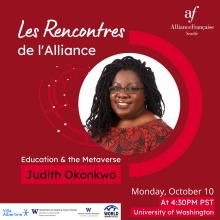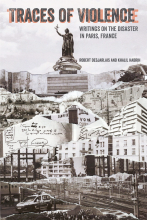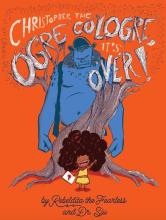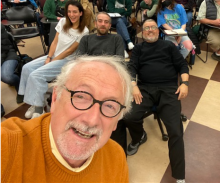Guest Lecture : Education and the Metaverse with Judith Okonkwo (October 10th, 2022)
Judith Okonkwo is a business psychologist and technology evangelist, based in Nigeria. She is a current resident of San Francisco French Consulate's Villa Albertine and the creator of the Oriki Coaching Model™ and a co-founder of We Will Lead Africa. She is a Fellow of the Royal Society of Arts and is a Member of the World Economic Forum’s Global Future Council for Virtual and Augmented Reality. In 2016, Judith Okonkwo founded Imisi 3D, an XR lab in Lagos focused on building the African ecosystem for extended reality technologies (AR/VR/MR), and connecting XR communities across the continent. In 2017, she set up AR/VR Africa which holds large XR events on the continent, such as the 2020 AR/VR Africa hackathon, which had participants from 28 African countries. Cosponsored by the Alliance Française de Seattle, the World Affairs Council, and the African Studies Program of the Henry M. Jackson School of International Studies.
Book Talk: Traces of Violence: Reflections on colonial geographies and collaborative ethnography in Paris, France with Robert Desjarlais and Khalil Habrih (November 8th, 2022)
In Traces of Violence: Writings on the Disaster in Paris, France, Robert Desjarlais and Khalil Habrih present a dialogic account of the lingering effects of the terroristic attacks that occurred in Paris in November 2015. Situating the events within broader histories of state violence in metropolitan France and its colonial geographies, the authors interweave narrative accounts and photographic images to explore a range of related phenomena: governmental and journalistic discourses on terrorism, the political work of archives, police and military apparatuses of control and anti-terror deterrence, the histories of wounds, and the haunting reverberations of violence in a plurality of lives and deaths.
Traces of Violence offers an innovative example of collaborative writing across anthropology and sociology. The writing of the book proceeds in interwoven ways with distinct texts essayed by the two authors working in dialogue with one another, and with some passages serving as “interruptions” to the main texts found in each chapter. Co-sponsors: Comparative History of Ideas, Simpson Center for the Humanities, African Studies, Global Studies, Jackson School of International Studies, French and Italian Studies, Anthropology
Khalil Habrih is a doctoral candidate in Anthropology at the University of Ottawa, where they study and teach. Khalil Habrih has conducted socio-anthropological research in Paris, France since 2015; an ethnography of police presence in La Goutte d’Or (Paris, 18e) attentive to both the state’s territorialization of “Priority Zones for Security” and the memorialization of state violence by the people who live within such zones. Their current anthropological research attends to questions of erotics and violence in contemporary and colonial urbanism in the 18th arrondissement of Paris.
Robert Desjarlais is an American writer and Professor of Anthropology at Sarah Lawrence College. He has conducted anthropological research in several distinct settings, from the Nepal Himalayas to North America. Significantly, Robert Desjarlais’ work focuses on the formation of subjectivities, and continues to contribute an anthropology grounded in critical phenomenology. Continuing and reformulating the research he has recently undertaken in France, on the aftermath of the 13 November attacks in Paris, Robert Desjarlais’ current work attends to questions of image, violence, and the politics of “life death” in postcolonial France and Algeria.
Book Talk: Smashing Foundational Fairytales One Children's Book at a Time with Dr. Oriel Siu (October 11th, 2022)
Dr. Oriel Siu read her latest children's book, Christopher the Ogre Cologre, It's Over!, which dismantles one of the biggest lies still taught in schools today: the myth of discovery. It is the first children's book to openly talk about white settler colonialism and help educators guide discussion on white supremacy's foundations in the US. The event included book signings, a question and answer session, and a pupusa lunch. The first 30 UW students to register received a free signed copy of Dr. Siu's book
This event was cosponsored by the Department of French and Italian Studies, Department of Spanish and Portuguese Studies, African Studies Program and Latin American and Caribbean Studies Program of the Henry M. Jackson School of International Studies, Center for American Indian and Indigenous Studies, and the Information School.
Oriel María Siu, Ph.D., is a writer, scholar and educator of Náhuat/Pipil/Chinese descent born and raised in San Pedro Sula Honduras (1981). The LA Times called the first book of Dr. Siu's children's book series, "pioneering." Her second book, Christopher the Ogre Cologre, It's Over! - published in August of 2021 - has received national praise from social justice educational spaces, independent media outlets, and Ethnic Studies educators and programs throughout. Organizations like Rethinking Schools are encouraging the use of her work in the middle school classroom. High schools and universities alike are using Christopher the Ogre Cologre, It's Over! as part of Education, Race, and American Studies teacher training programs.
Guest Seminar: Bande dessinée Author Jessica Oublié visits FRENCH 303 Course (November 17, 2022)
Assistant Teaching Professor Irina Markina invited author Jessica Oublié to lead a virtual guest seminar for her FRENCH 303: La Bande dessinée francophone class. Jessica Oublié is a French, Martiniquan, and Guadeloupian award-winning scénariste whose bande dessinée Péyi an nou, a documentary graphic novel on the Bureau for the Development of Migration in the Overseas Departments (BUMIDOM in French), won the prix étudiant de la bande dessinée politique in 2018. In FRENCH 303 students have created short, focused bande dessinée of their own throughout the class and this scenario workshop will be the last step in preparing them for the final project.
Professor Markina reports " it was a treat to discuss this rich and complex work with the author herself. Ms. Oublié not only led a fascinating discussion on her past, current, and future projects, but also generously offered to give students feedback on their own ideas for the final project. At the end of her guest seminar, we came away with an insider's look at what it takes to conceive and create a bande dessinée, a genre which is so widely read and appreciated in many francophone countries. It was truly an honor to (virtually) welcome Jessica Oublié in our FRENCH 303 classroom!"
Italian Film Directors visit ITAL 356 Contemporary Italian Cinema Course (Nov. 10, Nov. 15)
Each year the Department of French & Italian Studies co-sponsors Cinema Italian Style, the Seattle Film Festival's celebration and screening of Italian films. This autumn Associate Teaching Professor Claudio Mazzola invited three directors of the films to visit his class on contemporary Italian cinema. The three directors presented their films which all dealt with engaging social issues facing Italians.
Blessed Boys directed by Silvia Brunelli dealt with a complicated relationship between two young men in a busy district of Naples. Delta directed by Michele Vannucci focuses on immigration in the Po valley when local fishermen violently clash with immigrants from Romania. It also had an important environmental issue at the center of the story: the fight against poachers. Amanda, the directorial debut of Carolina Cavalli is a coming of age drama about a young woman from a very wealthy family. Each director talked about their films, took questions and had a lively conversation with the class. Students particularly appreciated the films presented a look at some of the real world issues facing a diverse cast of characters throughout Italian society.




